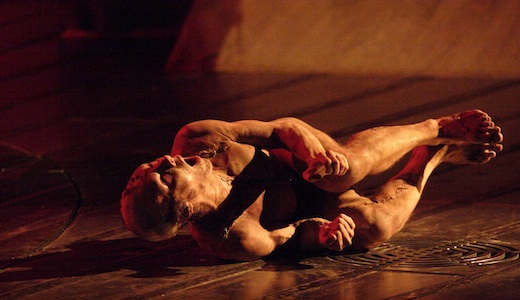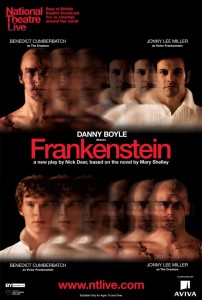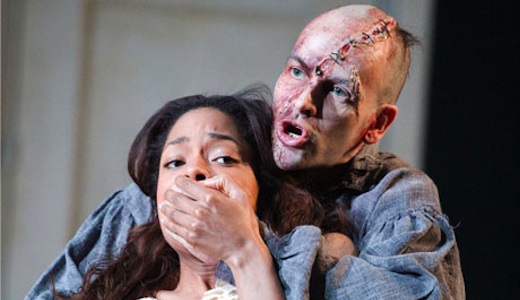Since June 2009, London’s venerable Royal National Theatre has expanded into High-Definition broadcasts of their productions. Transmitted live into cinemas in comparable time zones, the performances are otherwise screened in the manner of feature films in movie houses further afield. Boasting the finest in theatrical talent, the National Theatre Live series has quickly developed a loyal following, and their latest production makes it easy to see why.
Long before a remarkable film career that would include the likes of Trainspotting, 28 Days Later and the Oscar-winning Slumdog Millionaire, Danny Boyle started out in the theatre, directing productions for the Royal Court Theatre Company and the Royal Shakespeare Company. First conceiving of a stage version of Mary Shelley’s Frankenstein around two decades ago, Boyle has finally brought his concept to fruition. Adapted for the stage by Nick Dear (Power, The Art of Success), this production takes the venerable 1818 novel and reinterprets it to dazzling visceral and dramatic effect.
Casting Jonny Lee Miller (of Boyle’s Trainspotting) and Benedict Cumberbatch (no stranger to reinventions of the classics, as the star of TV’s Sherlock) as the leads, Boyle has taken the unusual step of having the two actors alternate between shows in the roles Dr Victor Frankenstein and The Creature. As such, there’s an incentive for audiences to see more than one performance, which – with two such remarkable actors – likely helped contribute to the show’s remarkable commercial success. Performances of both versions have been recorded as part of National Theatre Live, and the performance reviewed here is known as Performance B, with Miller as The Creature and Cumberbatch as Victor.
Dear’s adaptation places a greater emphasis on The Creature than most other interpretations, possibly greater than any other filmed version of the tale. We are there with him from the moment of his “birth”, realised in an astonishing sequence in which he bursts from a canvas “womb” and falteringly learns how to move. Immediately rejected and driven away by his conflicted creator, The Creature is the object of scorn and revulsion from myriad peasants, only to be taken in and educated by the kindly – and blind – De Lacey (Karl Johnson, in a beautifully tender performance). From De Lacey, The Creature learns to read, and learns to feel, becoming articulate and soulful, despite his mangled visage and impaired speech. However, an act of cruelty at the hands of De Lacey’s son (Daniel Millar) and daughter-in-law (Lizzie Winkler) drives The Creature away.
Possessing the diary of his creator, The Creature tracks Victor down to his family estate, where the doctor has returned to marry his cousin Elizabeth Lavenza (Naomie Harris, another Boyle veteran, from 28 Days Later). When Victor’s little brother William is found dead, Victor becomes aware that his creation has come for him. Wrestling with the enormity of what he has done – creating life from lifelessness, interfering in the natural order – Victor finds himself blackmailed by his creation into making for him the one thing he desires – a mate. Having learned of the idea of love from De Lacey’s teachings, and yet faced little more than viciousness from all whom he encounters, The Creature desperately yearns for some kind of companionship. But Victor, conscious of the powers in which he is dabbling, begins to have grave fears about the greater implications of his actions. Ultimately, the fates and fortunes of both men are deeply intertwined.
Far beyond the traditional gothics of most film versions, Boyle creates a remarkably imaginative visual pastiche, with elements of steampunk effectively woven into the period designs and mannerisms. The set design by Mark Tildesly is incredible, with a rotating centre stage, and sets that disappear into the floor or rise into the rafters. The score by Underworld (who also collaborated on the sound design) is an eerie, pulsating delight, while Bruno Poet’s lighting is a wonder to behold, particularly during the kinetic “birth” sequence. Unlike many filmed plays, which can be rendered rather too static when put on screen, the multi-camera direction by Tim Van Someren is mobile and immersive. You know you’re watching a filmed play, but the screen direction keeps it immersive instead of distancing, and rarely does it feel excessively “cinematic”.
Dear has brought so much that is resonant and rich within the original text to the surface. It’s easy to glibly remark on how Shelley’s book can be looked on today in regards to modern developments such as cloning and stem-cell research, but Dear articulates the ethical and moral dilemmas of the novel with depth and thoroughness. As such, you’re conscious of the allegory, but in a way that isn’t obvious or intrusive. But what really shines in his script is the psychological exploration of the two protagonists. The Creature is a man capable of both enormous love and equally intense hatred, articulate and primal at the same time. Though many of his acts are monstrous, we can see the logic to them, because as the audience, we’ve experienced everything he has, and it is because of this, that he maintains our empathy right to the very end. Victor, in contrast to his creation, has the world at his feet (career, prominent family, loving fiancee), yet throws everything away due to an inability to recognise, let alone appreciate, the love that others have for him. Which is, of course, the same kind of love that The Creature recognises and appreciates, yet can never have himself. The two have a Yin and Yang relationship, presented as true equals in dramatic stature, a feat rarely accomplished in other adapatations.
Dear’s writing is complimented by two extraordinary central performances. Cumberbatch is dashing, yet believably and palpably blocked by his obsession with his work, and his difficulty connecting to those around him is subtly conveyed. There’s a fierce intensity and committment in his performance that is mesmerising. Even better is Jonny Lee Miller. It’s one thing to have seen Miller in his numerous film and TV roles – and he’s always been excellent, no matter the material – but he is truly revelatory here. The speech, the movement, the sheer radiating emotion of his performance is simply devastating. He’s funny, repugnant, ferocious and heartbreaking, and there’s never a false note in his portrayal.
Danny Boyle’s Frankenstein is playing just a few short engagements all over the country. If you want to see a truly remarkable revitalisation of one of the great literary milestones, you simply cannot do better than this.
Frankenstein (Performance B) is screening in selected cinemas on April 16th and 17th, with additional dates in some venues, and is distributed by Sharmill Films.






